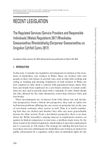 January 2019 in “Industrial Law Journal”
January 2019 in “Industrial Law Journal” The regulations aimed to improve domiciliary care in Wales by ensuring better work conditions and visit schedules.
[object Object]  April 2017 in “The journal of investigative dermatology/Journal of investigative dermatology”
April 2017 in “The journal of investigative dermatology/Journal of investigative dermatology” Most patients experienced mild to moderate skin problems during a trial for a desmoid tumor treatment.
 January 2017 in “Acta dermato-venereologica”
January 2017 in “Acta dermato-venereologica” The congress showed that psychological therapy can help skin condition patients, social media affects acne stigma, education improves atopic dermatitis, and patient satisfaction in dermatology is high, especially with good doctor engagement.
 July 2016 in “American Journal of Dermatopathology”
July 2016 in “American Journal of Dermatopathology” The meeting showcased rare skin disease cases, highlighting the need for accurate diagnosis and treatment.
 January 2016 in “Elsevier eBooks”
January 2016 in “Elsevier eBooks” The conclusion is that grasping how cells determine their roles through evolution is key, with expected progress from new research models and genome editing.
January 2016 in “Dermatology Online Journal” Hormonal therapy changes skin and hair in transgender patients, who need better researched dermatologic care.
[object Object]  July 2015 in “British Journal of Dermatology”
July 2015 in “British Journal of Dermatology” Treating skin conditions with both psychological and dermatological care improves patient outcomes and can save costs.
 January 2015 in “Elsevier eBooks”
January 2015 in “Elsevier eBooks” Nanocarriers like liposomes and cyclodextrins improve how angiotensin-(1-7) is delivered in the body.

Lupus is a complex disease that requires personalized treatment because it varies greatly between individuals.
 July 2012 in “Springer eBooks”
July 2012 in “Springer eBooks” The document concludes that proper diagnosis and treatment of nonscarring alopecias can improve quality of life and hair regrowth is possible as the hair follicle remains intact.
 January 2012 in “Else Kröner-Fresenius Symposia”
January 2012 in “Else Kröner-Fresenius Symposia” Maintaining DNA integrity in stem cells is crucial to prevent aging and cancer.
 February 2008 in “Experimental dermatology”
February 2008 in “Experimental dermatology” Oxidative stress plays a significant role in vitiligo, and both skin and non-skin cells may be involved.

Isotretinoin and tazarotene help treat acne, while minoxidil and finasteride promote hair growth.
 April 2003 in “Experimental Dermatology”
April 2003 in “Experimental Dermatology” The workshop highlighted the genetic links and psychological impacts of hair loss and skin disorders.
 January 2022 in “Journal of Healthcare Sciences”
January 2022 in “Journal of Healthcare Sciences” Male Androgenetic Alopecia, a common hair loss in men, can be slowed and partially restored with treatments like minoxidil and finasteride, or hair transplantation. Serenoa repens may be an alternative treatment. More research is needed for new treatments.
 January 2020 in “Química Nova”
January 2020 in “Química Nova” The PW91 method is best for calculating the basic physical and chemical properties of Finasteride, a drug used for prostate issues and hair loss.

EFBL offers hidden incisions, faster recovery, and fewer risks, but may raise hairline and cost more.

Hair loss can cause significant social and emotional issues, especially for women and young men.
 1 citations,
December 2024 in “Qeios”
1 citations,
December 2024 in “Qeios” Hair loss affects attractiveness but can suggest intelligence, and face perception is complex, involving factors like age and smile.
9 citations,
June 2013 in “Journal of Cosmetic Dermatology” Lateral oblique forehead lines are caused by muscle movement, not sleep positions, and can be treated with botulinum toxin A.
 September 2020 in “bioRxiv (Cold Spring Harbor Laboratory)”
September 2020 in “bioRxiv (Cold Spring Harbor Laboratory)” Glutamic acid helps mice grow hair.
143 citations,
January 2007 in “The American Journal of Human Genetics” Certain genes on chromosomes 6, 10, 16, and 18 may increase the risk of alopecia areata.
35 citations,
September 2006 in “American Journal Of Pathology” Odontogenic keratocysts are caused by abnormal Hedgehog signaling and can lead to tooth and bone issues.
27 citations,
January 2015 in “International Journal of Trichology” The supplement helps improve hair growth and reduce hair shedding.
15 citations,
March 2000 in “The journal of investigative dermatology/Journal of investigative dermatology” As skin cells mature, vitamin D receptor levels decrease while retinoid X receptor α levels increase.
 13 citations,
July 2020 in “bioRxiv (Cold Spring Harbor Laboratory)”
13 citations,
July 2020 in “bioRxiv (Cold Spring Harbor Laboratory)” Four drugs were found that could potentially treat COVID-19 by inhibiting the virus in lab tests.
12 citations,
September 2013 in “BMC Biophysics” Keratin filaments' elasticity is influenced by their terminal domains and surrounding medium.
5 citations,
April 2023 in “Pharmaceuticals” The new delivery system improved hair growth in alopecia treatment.
 5 citations,
September 2021 in “Frontiers in Cell and Developmental Biology”
5 citations,
September 2021 in “Frontiers in Cell and Developmental Biology” Dihydrotestosterone treatment on 2D and 3D-cultured skin cells slows down hair growth by affecting certain genes and could be a potential target for hair loss treatment.
5 citations,
October 2017 in “Journal of Mind and Medical Sciences” Finasteride treatment should be personalized to individual mental profiles.





















